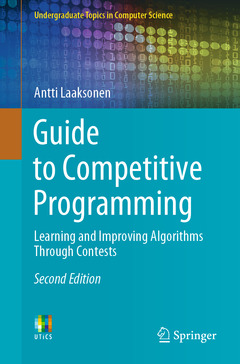Description
Guide to Competitive Programming (2nd Ed., 2nd ed. 2020)
Learning and Improving Algorithms Through Contests
Undergraduate Topics in Computer Science Series
Author: Laaksonen Antti
Language: English
Subjects for Guide to Competitive Programming:
309 p. · 15.5x23.5 cm · Paperback
Description
/li>Contents
/li>Biography
/li>Comment
/li>
Building on what already is the most comprehensive introduction to competitive programming, this enhanced new textbook features new material on advanced topics, such as calculating Fourier transforms, finding minimum cost flows in graphs, and using automata in string problems. Critically, the text accessibly describes and shows how competitive programming is a proven method of implementing and testing algorithms, as well as developing computational thinking and improving both programming and debugging skills.
Topics and features: introduces dynamic programming and other fundamental algorithm design techniques, and investigates a wide selection of graph algorithms; compatible with the IOI Syllabus, yet also covering more advanced topics, such as maximum flows, Nim theory, and suffix structures; surveys specialized algorithms for trees, and discusses the mathematical topics that are relevant in competitive programming; reviews the features of the C++ programming language, and describes how to create efficient algorithms that can quickly process large data sets; discusses sorting algorithms and binary search, and examines a selection of data structures of the C++ standard library; covers such advanced algorithm design topics as bit-parallelism and amortized analysis, and presents a focus on efficiently processing array range queries; describes a selection of more advanced topics, including square-root algorithms and dynamic programming optimization.
Fully updated, expanded and easy to follow, this core textbook/guide is an ideal reference for all students needing to learn algorithms and to practice for programming contests. Knowledge of programming basics is assumed, but previous background in algorithm design or programming contests is not necessary. With its breadth of topics, examples and references, the book is eminently suitable for both beginners and more experienced readers alike.Introduction
Programming Techniques
Efficiency
Sorting and Searching
Data Structures
Dynamic Programming
Graph Algorithms
Algorithm Design Topics
Range Queries
Tree Algorithms
Mathematics
Advanced Graph Algorithms
Geometry
String Algorithms
Additional Topics
Appendix A: Mathematical Background
Dr. Antti Laaksonen has worked as a teacher and researcher at the University of Helsinki and Aalto University, Finland. He has served as one of the organizers of the Finnish Olympiad in Informatics since 2008, and as the Scientific Chair of the Baltic Olympiad in Informatics in 2016. He has also coached and led the Finnish team at several international programming contests, including the International Olympiad in Informatics 2009–2016, and has established experience in teaching programming and algorithms.
Provides a comprehensive introduction to algorithmic problem solving in the context of programming contests
Describes numerous “folklore” algorithm design tricks used by experienced competitive programmers
Presents an intuitive understanding of why algorithms work and how to design them




